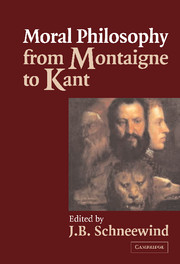Book contents
- Frontmatter
- Contents
- Preface
- Acknowledgments
- Foreword to the One-Volume Reprint
- Introduction
- PROLEGOMENA: SOME QUESTIONS RAISED
- PART I REWORKING NATURAL LAW
- PART II INTELLECT AND MORALITY
- PART III EPICUREANS AND EGOISTS
- Pierre Gassendi
- Pierre Nicole
- Bernard Mandeville
- John Gay
- Claude Adrien Helvétius
- Paul Henri Thiry, Baron d'Holbach
- William Paley
- Jeremy Bentham
- PART IV AUTONOMY AND RESPONSIBILITY
- Supplemental Bibliography
William Paley
Published online by Cambridge University Press: 05 June 2012
- Frontmatter
- Contents
- Preface
- Acknowledgments
- Foreword to the One-Volume Reprint
- Introduction
- PROLEGOMENA: SOME QUESTIONS RAISED
- PART I REWORKING NATURAL LAW
- PART II INTELLECT AND MORALITY
- PART III EPICUREANS AND EGOISTS
- Pierre Gassendi
- Pierre Nicole
- Bernard Mandeville
- John Gay
- Claude Adrien Helvétius
- Paul Henri Thiry, Baron d'Holbach
- William Paley
- Jeremy Bentham
- PART IV AUTONOMY AND RESPONSIBILITY
- Supplemental Bibliography
Summary
Introduction
William Paley was not a very original thinker. The philosophical part of his treatise on ethics is an assemblage of ideas developed by others and is presented to be learned by students rather than to be debated by colleagues. But this lack of originality did not stand in the way of Paley's success. His Principles of Moral and Political Philosophy (1785) was a required text at Cambridge University until the 1830s and was widely taught elsewhere in Britain and in the United States. Most of the book is taken up by detailed discussion of our duties to God, ourselves, and others. The opening part gives the fullest account available of the position generally known as theological utilitarianism, and as such it is still worthy of study.
Paley was born in 1743 and died in 1805. He studied at Cambridge, graduating in 1763 with great distinction. He taught at a small school near London until he was called back to Cambridge, where for some years he gave instruction in moral philosophy, divinity, and the Greek testament. Through personal connections Paley obtained various positions in the Church of England, the highest of which was that of archdeacon of Carlisle. His Moral and Political Philosophy was based on lectures he had given at Cambridge, and his later works were defenses of Christianity. The View of the Evidences of Christianity (1794) defended the credibility of miracles.
- Type
- Chapter
- Information
- Moral Philosophy from Montaigne to Kant , pp. 446 - 459Publisher: Cambridge University PressPrint publication year: 2002

